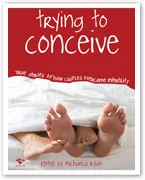Whether you’ve just started trying to conceive or have been at it for a while, there are things that can help you get pregnant fast. From what you eat to how often you have sex, get clued up with these pearls of wisdom from the fertility experts.
1. Have regular sex
“Every two or three days is ideal, as too much ejaculation or prolonged abstinence both have adverse effects on sperm quality and quantity,”explains Dr Sarah Brewer, author of Planning a Baby? A Complete Guide to Pre-Conceptual Care . “Although if you’ve struggled to conceive in the past, it may be worth approaching it differently and holding off for as long as seven days before having sex during your fertile peak – this lets your partner’s sperm count build up.”
2. Ditch the cigarettes
“If you can’t stop, then cut right down,” says Sarah. “Women who smoke 10 or more cigarettes a day are three times more likely to have difficulty conceiving than non-smokers.”
3. Forget the Kama Sutra
“When it comes to sex positions, missionary with a slightly tilted pelvis (i.e. a cushion under your bottom) can help,” says Emma Cannon, fertility specialist and author of The Baby Making Bible. “But really I think the best advice is just to get on with it. Becoming too obsessive can create tension.”
4. Get weight ready
“If you need to reduce your weight, do this before starting to try for a baby,” says Emma. “Being over or under weight can both have a negative impact on fertility, but if you lose too much weight too quickly while you’re TTC, your body thinks it isn’t the optimum time to conceive.”
5. Look after your body
If you’re trying to get pregnant, slowing down and taking care of your body is key, as Emma Cannon points out. “Over the last five years, I’ve noticed the exercise routines that women are putting themselves through can be really intense and really rigorous. The problem with this is it floods the body with adrenaline, which can tell the body it’s not a particularly good time to conceive. If you’ve been trying for a while and you are struggling, you need to just take a look at your exercise routine.”
6. Focus on the present
‘It’s difficult not to obsess about becoming pregnant and having a baby,’ says life coach and relationship expert Sloan Sheridan-Williams. “I advise clients trying to conceive that the best way to reduce this stress is to shift your focus from the end goal to the present – so savouring daily activities you’d usually rush through. When you let yourself live in the moment, things feel less overwhelming for you both.”

Focus on the present.
7. Put down the bottle opener
“One study found that women who drink five or less units of alcohol per week were twice as likely to conceive within six months than those drinking ten units or more,” says Sarah.
8. Don’t forget your relationship
“When all your attention is on the process of trying to conceive, emotions can be neglected, which can lead to frustration, anger and disappointment,” says Sloan. ‘So, actively make couple time to do things you enjoy and talk about everything other than conception.’
9. Balance your eating
“But don’t be fooled by fad diets,” says Emma. “It’s a good idea to cut out processed foods, but don’t be tempted to ditch whole food groups or replace meals with juices. And go for foods that are high in antioxidants, omega 3 oils and protein.” Emma also recommends not to eat raw foods after 4pm, as these can chill the digestion and lower the core body temperature.
10. Maximise your nutrition
“As a safety net, take a multivitamin and mineral supplement especially designed for pregnancy or conception,” says Sarah. “You’re looking for something that includes folic acid (400mcg daily), which helps to prevent certain developmental disorders in your baby such as spina bifida.”
11. Find success stories
“Athletes look to people who have achieved what they want and recreate it, and in the same way this is a good time to look at tips and techniques that have worked for others and find one that feels authentic to you,” says Sloan. “Acupuncture has been shown to reduce stress, and self-hypnosis is good for relaxation.”
This story originally appeared on Mother & Baby

-scaled.jpg?resize=380%2C285)

